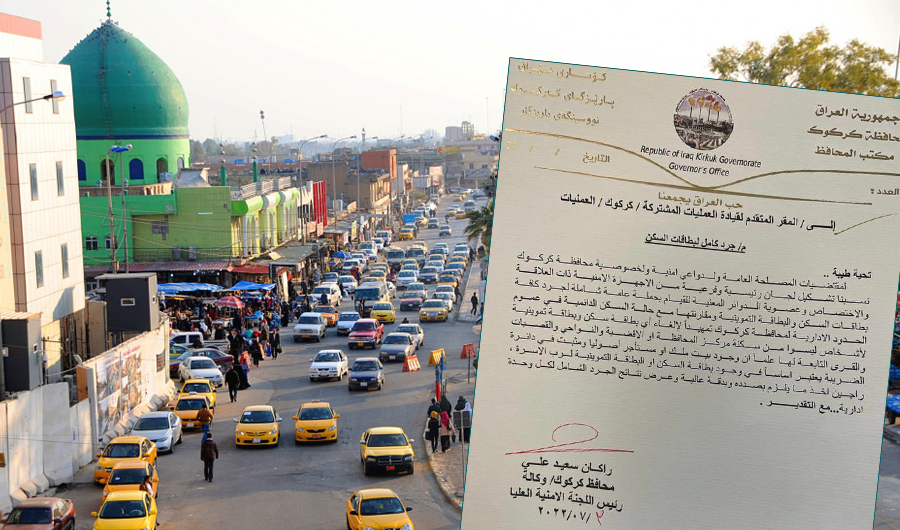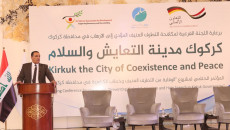The local administration of the northern oil-rich city of Kirkuk says that no citizens of Kirkuk will be deprived of their residence cards and food coupons, even if they leave the province under any circumstances and for any reason. He stressed that the letter "has not yet been numbered to be cancelled.
Acting governor of Kirkuk Rakan Saeed al-Jibouri has issued a letter dated June 3rd, 2022 yet not stamped or circulated, to null food coupons and residence cards for those Kirkukis not residing Kirkuk which should be proven by deed registry or a legal rent contract, a matter the Kurds consider targeting them.
"We will conduct a comprehensive inventory of residence cards and food coupons, then compare them with their permanent residences, in preparation for the cancellation of any residence cards and food coupons of those not living in the center of Kirkuk and or its subrbs."
The Kurds believe by this action, the acting governor, an Arab who is in office since 2017 when the Iraqi forces ousted Kurdish forces who were controlling Kirkuk and most of the disputed territories of Iraq since 2003 following the toppling of Saddam Hussein regime.
"After receiving the letter, to deprive the Kurdish families whose houses are not registered in the food coupons and housing cards, we intervened directly,” said Shakhawan Abdullah, the second deputy speaker of the Iraqi parliament, a leader of the Kurdistan Democratic Party KDP led by Masoud Barzani.
"The decision of the governor of Kirkuk is completely chauvinistic and contrary to all principles of coexistence, legal and constitutional principles and must apologize," said Fahmi Burhan, chairman of the Kurdistan Regional Government's (KRG) commission for territories outside the Kurdistan Region of Iraq KRI.
The decision of the imposed governor of Kirkuk is a completely chauvinistic decision and contrary to all the principles of coexistence and legal and constitutional principles
Kirkuk, 238 kilometers north of Baghdad, is an ethnically mixed province for 1,7 million Kurds, Sunni and Shiite Arabs, and Turkmens. It has long been at the center of disputed territories between Baghdad and Erbil.
The Kurds had an upper hand in Kirkuk up to October 16, 2017 when the Iraqi forces took over power in Kirkuk and the disputed territories. An Arab governor replaced the late Kurdish governor, Najmaddin Karim.
Kirkuk is one of the main disputed territories in addition to Diyalah and Nineveh, that a three-stage process was outlined in Article 140 of the Iraqi constitution in 2005 to put an end to the disputes over these areas between the Kurdistan Region Government KRG and Federal Iraqi government dispute, through normalization, population census and a referendum on the status of the territories.
A senior source in the Kirkuk provincial office, on the condition of anonymity, explained to KirkukNow that “the letter has not yet been issued in order to be cancelled.”
"But we are working to get the letter issued and published as soon as possible," he affirmed.
We will work to get the letter published as soon as possible
"There will be a number of positive aspects, including the return of the refugees to their controlled areas in all provinces, which will play a role in the reconstruction of their areas and resume ordinary life," the source added.
Thousands of refugees from Salahaddin, Ninewa and other provinces in Kirkuk have not returned to their homes.
Thousands of families have left the province after the events of October 16, 2017 and have not returned to Kirkuk, while their state-subsidized, monthly food ration coupons and residence cards are in Kirkuk.
Thousands of others have not returned to Kirkuk since 1991, when they were displaced during the Ba'ath regime led by Saddam Hussein, and have food coupons and residence cards in Kirkuk.
"This measure does not target any Kirkuk citizens and citizens of the province, even if they have previously left the city under any circumstances and for any reason, according to this measure, neither residence card nor food coupons will not be withdrawn,” the anonymous source emphasized.
Back in 2018, the Turkmens and Arabs each have got each three seats of the 12 parliamentary seats of Kirkuk and the rest six has gone to the Patriotic Union of Kurdistan PUK, one of the key Kurdish parties and stakeholder of the Iraqi Kurdistan Regional Government KRG along with its decades’ ally-competitor KDP which boycotted elections in Kirkuk.
In October 10th, 2021 general elections, Turkmen candidates have won two seats while the Arabs have got four seats. The PUK has lost half of its seats, 2 to KDP and one for the New Generation.
Currently, the Iraqi army, local and federal police, Brigade 61 of Special Forces along with Shiite paramilitary of Popular Mobilization Forces PMF, are under Kirkuk joint operations’ command, an umbrella for the security forces running the security of Kirkuk province.






